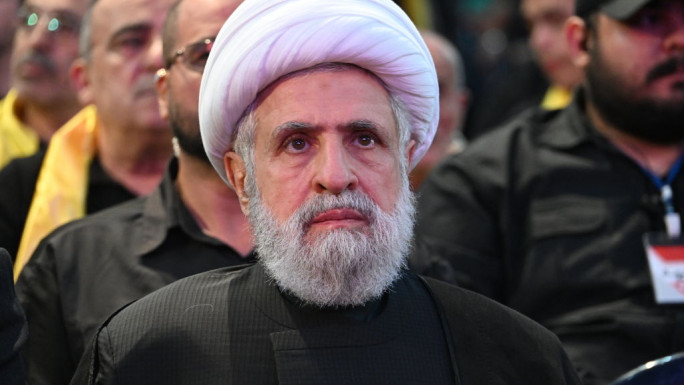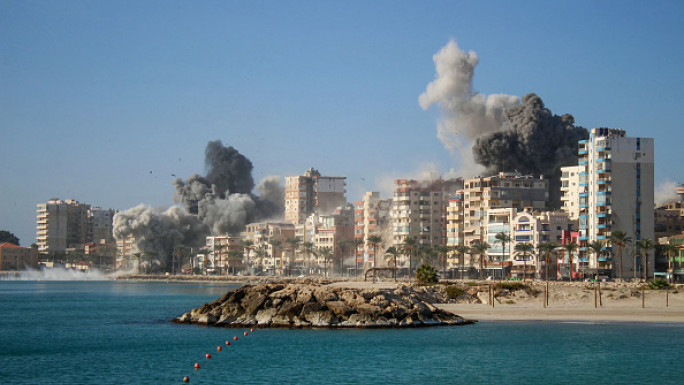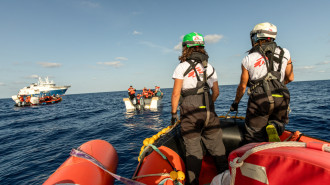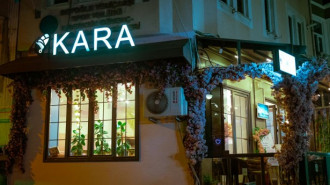A tribute to Syria's unsung heroes on Labour Day
As the lives of civilians in Syria are disrupted by airstrikes and fragile ceasefires, only cleaners maintain their regular work, cleaning streets and collecting waste from residential areas.
In addition to the usual hardships that come with the job, such as the long hours and working under harsh weather conditions, these workers face the dangers of airstrikes and clashes, as well as countless other tragedies.
In the northern Syrian city of Aleppo, where regime airstrikes have killed at least 246 civilians in just over 10 days, cleaners find it challenging to go about doing their job.
"Those responsible for waste collection cannot perform their work during airstrikes, as they fear being targeted," Abu Hassan says.
"Waste can pile up for days in some areas."
According to Brita Haji Hassan, the president of Aleppo's city council, nearly 400 cleaners who collect waste from six city districts are forced to use tractors due to the lack of garbage trucks.
"The main problem remains the airstrikes, which hinder our work," he told The New Arab.
"Our workers are real heroes who work under the worst and most dangerous of circumstances," he added.
"We have lost 25 workers so far, including two who were spraying insecticides to prevent the spread of Leishmania parasites when the regime targeted Aleppo with airstrikes."
Even though the city's cleaners receive their salaries regularly at the moment, says Hassan, they remain without a stable source of income.
 |
Our workers are real heroes who work under the worst and most dangerous of circumstances. - Brita Haji Hassan |
 |
"Last year, they worked for six months without getting paid," he explained.
"We launched several projects to secure revenues, but they failed due to the deteriorating situation, and we cannot impose taxes on people who are already suffering from poor living conditions."
Um Jehad says her 55-year-old husband did not realise how exhausting the job was until he began working as a cleaner in Aleppo nearly a year and a half ago.
In Aleppo, the waste collectors are forced to use their hands, amid extreme weather conditions and a water shortage that could last up to a week.
"Sometimes my husband cannot shower because there is no water, so children stay away from him due to the smell," she said.
"But we have to endure this in order to live," she added.
"I have tried several times to talk him into working as a vendor instead, but he refused, saying that this was the best job Aleppo could offer for someone his age."
Clearing the rubble
In Eastern Ghouta, cleaners working under the local council collect waste and place it in landfills outside each village or town.
Abu Mohammad, a father of three, says when he leaves to work every morning, he does not know what is waiting for him.
"While my children are sleeping, I wonder whether I would live to see them in the evening," he said.
"Sometimes I forget we are at war, but hours later, I hear helicopters and fighter jets flying over my head," he added.
 |
| Sometimes the cleaners have to clean up the destruction caused by airstrikes [AFP] |
"We only stop working under extremely dangerous conditions, like when the airstrikes are too close."
Abu Mohammad, who has worked as a cleaner for over seven years, says he is proud of his profession, and that he would hold on to it as long as he stays in Ghouta.
He added that he had been suffering from lower back pain for months, but could not get an X-ray because the hospital lacks the necessary equipment.
"In the early morning hours, we see a lot of tragedies that people do not see during the day," he says.
"One time, my colleague and I found an infant dumped on the side of the road, so we took him to a charity organisation," he added.
"Another time, we found an elderly woman sleeping in the street after her house was destroyed.
"We also see children searching garbage bins for food."
In areas controlled by the opposition, cleaners do not only collect the usual waste; sometimes they have to clean up the destruction caused by airstrikes.
"Tractors remove the larger rubble, while we clear the waste," says Abu Kifah.
"We do this in order to open up the streets for people to return to work and life," he added.
"Even though we do not make enough money, we continue to serve our people and our children, as well as protect them from disease."
![Aleppo airstrikes [Anadolu] Aleppo airstrikes [Anadolu]](/sites/default/files/styles/image_345x195/public/media/images/D88B8412-462B-49D0-BCF8-40BE25A8EB0D.jpg?h=d1cb525d&itok=ZTXWfpB1)



![Lebanon under war [Getty]](/sites/default/files/styles/image_684x385/public/2180906518.jpeg?h=a2bbb9fd&itok=RtUKpE1h)
 Follow the Middle East's top stories in English at The New Arab on Google News
Follow the Middle East's top stories in English at The New Arab on Google News


